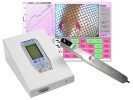Authors
B Gryzlo, P Zareba, K Malawska et al
Lab
Faculty of Pharmacy, Jagiellonian University Medical College, Krakow, Poland
Journal
ACS Chemical Neuroscience
Abstract
Neuropathic pain resistance to pharmacotherapy has encouraged researchers to develop effective therapies for its treatment. Gamma-Aminobutyric acid (GABA) transporters 1 and 4 (mGAT1 and mGAT4) have been increasingly recognized as promising drug targets for neuropathic pain (NP) associated with imbalances in inhibitory neurotransmission. In this context, we designed and synthesized new functionalized amino acids as inhibitors of GABA uptake and assessed their activities toward all four mouse GAT subtypes (mGAT1–4). According to the obtained results, compounds 2RS,4RS-39c (pIC50 (mGAT4) = 5.36), 50a (pIC50 (mGAT2) = 5.43), and 56a (with moderate subtype selectivity that favored mGAT4, pIC50 (mGAT4) = 5.04) were of particular interest and were therefore evaluated for their cytotoxic and hepatotoxic effects. In a set of in vivo experiments, both compounds 50a and 56a showed antinociceptive properties in three rodent models of NP, namely, chemotherapy-induced neuropathic pain models (the oxaliplatin model and the paclitaxel model) and the diabetic neuropathic pain model induced by streptozotocin; however compound 56a demonstrated predominant activity. Since impaired motor coordination is also observed in neuropathic pain conditions, we have pointed out that none of the test compounds induced motor deficits in the rotarod test.
BIOSEB Instruments Used:
Electronic Von Frey 4 (BIO-EVF4),Electronic Von Frey 5 with embedded camera (BIO-EVF5)

 Pain - Thermal Allodynia / Hyperalgesia
Pain - Thermal Allodynia / Hyperalgesia Pain - Spontaneous Pain - Postural Deficit
Pain - Spontaneous Pain - Postural Deficit Pain - Mechanical Allodynia / Hyperalgesia
Pain - Mechanical Allodynia / Hyperalgesia Learning/Memory - Attention - Addiction
Learning/Memory - Attention - Addiction Physiology & Respiratory Research
Physiology & Respiratory Research
 Pain
Pain Central Nervous System (CNS)
Central Nervous System (CNS) Neurodegeneration
Neurodegeneration Sensory system
Sensory system Motor control
Motor control Mood Disorders
Mood Disorders Other disorders
Other disorders Muscular system
Muscular system Joints
Joints Metabolism
Metabolism Cross-disciplinary subjects
Cross-disciplinary subjects Preclinical studies and opioids: role in crisis management in the United States
Preclinical studies and opioids: role in crisis management in the United States 
